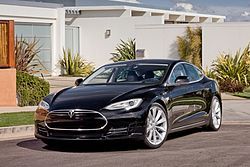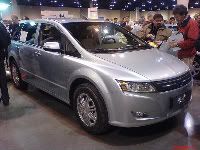Tesla Model S Is “Car of the Year”

I want one!

I want one!
When asked what 2GreenEnergy is, I normally talk about what we’re doing to forward the cause of clean energy, but I quickly add that we’re about sustainability more generally. I want to ensure that we play a role in any aspect of cleantech applied to transportation, agriculture, or any other discipline that affects humankind’s long-term viability.
Here’s a good example — our ongoing conversation on electric transportation, in which frequent commenter Glenn Doty wrote: (more…)
In response to a friend in South Africa who wanted my opinion on a business plan to bring fuel cells and solar PV to rural Africa, I wrote:
Very interesting. Certainly the solar product with batteries makes sense. I think (hope, at least) that the world is destined to bring renewable energy to rural Africa, leapfrogging the fossil fuel / utilities model of the rest of the world. I’m not as sure on the natural gas / fuel cell piece. I’d like to see microgrids with PV and wind, perhaps using microwind products like WindStream and mid-sized wind like Continental Wind or the Wind Turbine Company.
How all this works politically in Africa is anyone’s guess. Donors have trouble getting food and medical supplies to where they’re needed; I can’t imagine what this is going to be like.
Good luck!
In response to my recent piece on population growth and sustainability, frequent commenter Chris Daum writes:
The main issue, as I see it, is the education and empowerment of women. Educated women have fewer, healthier children and are able to contribute more to their community than just being breeders. Unfortunately, many of the poorest countries with high birth rates have cultures/religions that are against such empowerment. How are they to be convinced of their self-interest gained by educating their girls and women? (more…)
A reader asked if I would comment on this piece on using the carbon in CO2 to produce fuels.
Yes, I’ve seen this, and yes, it works, if we want methanol, which generally we don’t. I believe that the best answer to synthetic fuels is presented by Doty WindFuels, which will be using a different set of chemical processes to manufacture high grade diesel and high octane gasoline.
To write this post, I wanted to know the origin of the term “futurist.” Per Acceleration Watch:
The Oxford English Dictionary traces earliest English usage of the term futurist to 1842, referring to Christian scriptural futurists. The next usage occurs with the Italian and Russian Futurists of the early 20th century (1900’s-1930’s), an artistic, literary, and political movement that sought to reject the past and rather uncritically embraced speed, technology, and violent change.
In any case, the term meant very little until fairly recently, perhaps the 1990s, when people began to use the term in earnest. Now, futurists talk about Web 3.0 or 4.0 and God only knows what else. Of course, I’m just cutting up; I’m not seriously so dismissive of this bunch of very smart people…but I wonder how many of them view the coming years according to the conversation below, where a friend wrote me as follows: (more…)

Though the audience was thoroughly amused, there’s so much more here than entertainment. We were completely transported back in time, where we came face to face with some amazing insights from one of the sharpest minds and the keenest wits in the history of humankind.

The photo above is Twain in 1907; to the right is a recent shot of Holbrook. Needless to say, the costume/make-up is just as sharp as the performance itself.
I whole-heartedly recommend that readers try to catch this show, though, obviously, you’ll have to do so fairly soon; unfortunately, this can’t continue forever.

I just signed an online petition, addressed to Macy’s CEO Terry Lundgren, suggesting that he reconsider his company’s relationship with Donald Trump, arguably the single most repulsive person on the planet. The reasoning is below, for anyone who may be interested. (more…)